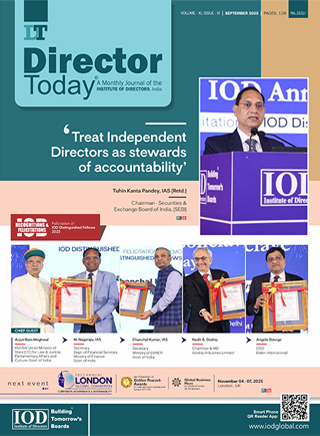Independent Directors and Furthering Board ESG Agendas

With the privileges of limited liability for companies come certain obligations for their directors. These duties need to be addressed in addition to the responsibilities executive directors may have as managers leading business unit, functional and other activities, and as shareholders, perhaps as a result of a remuneration package or incentive scheme. Busy executive directors confronted with unexpected crises, daily distractions and pressing multiple claims upon their time, sometimes lose sight of longer-term objectives, and what is happening beyond their own teams, departments and organisations.
When accompanied by a desire to fit in, not rock the boat, compromise and be seen as a team player, pressures on executive directors whose lives revolve around a single entity can lead to a loss of balance, independence, and objectivity, ‘groupthink’, narrowing perspectives, shortening time horizons and a lack of critical thinking and challenge. Independent non-executive directors with experience elsewhere, and the time to stand back, see a bigger picture and think longer-term, may contribute a broader perspective, greater objectivity, additional viewpoints, and qualities that complement those of executive director colleagues.
If directors understand what each other can add and there is engagement, frank dialogue, trust and mutual respect, the contribution a combination of executive and complementary independent non-executive directors may bring to the table can be magical. Greater diversity of approaches, experience, perspectives and ways of thinking can lead to further questioning and challenge, and the more comprehensive, rounded and searching discussions that may be conducive of creativity, innovation and grounded decision making. Why does this not always happen? How might more boards realise the possible benefits of independent directors?
Identifying and Monitoring Potential Fault Lines
When establishing strategic direction, formulating policies, developing and/or agreeing strategy, making decisions and being accountable by ensuring compliance or reporting performance, differences sometimes emerge between independent and executive directors. These could be of perspective, concern, emphasis or priority. For example, when well-intentioned but bullish independent directors push for more ambitious aims and targets executive directors may become anxious about a company’s ability to achieve them. Where discussion fails to achieve a consensus, over time disunity can occur.
In many boards there may be a potential, whether it or not it is realised, for a degree of fragmentation, as divisions emerge between independent directors who behave primarily as assessors, monitors and evaluators and executive directors who feel they are the board members being primarily assessed, monitored and evaluated. Independent directors may have other lives and sources of income that are largely unaffected by certain board decisions that may have a significant and even dramatic impact upon executive board colleagues.
All directors should be working towards the future success of a company. Progression towards stakeholder capitalism, and expectations and/or requirements that a wider range of interests are taken into account when board decisions are made, may create new fault lines. These may be exacerbated by a need for action and growing pressure to address certain challenges facing mankind such as climate change. While always trying to do what they feel is right, directors should be sensitive to varying perspectives and differing amounts of skin in the game among their board colleagues.
Ensuring Critical Thinking and Challenge
A board that is free of differences may be one that is asleep at the wheel rather than reading the road ahead, exercising foresight, anticipating or initiating, and steering a path away from or around obstacles and towards opportunities. Directors, whether independent or executive, should question and provide challenge, but independent board members should do so as a critical friend of executive colleagues and a CEO. This can require relevant experience and knowledge, and consideration of their application to a particular context, and what further information and support might be needed as situations, circumstances and contexts change.
Questioning, challenge and critique should be authoritative, informed and constructive. Some board members might be listened to and their views registered and considered, while others may be largely ignored. The former can occur when someone is thought to have integrity and be accountable, open and honest and is viewed as objective, fair and acting in the interests of a company The latter approach may be advisable if subjective views are expressed in favour of a personal agenda or vested interests and they are perceived as unbalanced or misleading.
To overcome inertia and vested interests, cope and progress, a certain level of ambition and drive may also be required, Proposals and actions may need to be tempered with realism in order not to exceed corporate resources and capabilities to achieve them. Realism, honesty and clarity may also be necessary concerning the aspirations and priorities of key stakeholders and business partners, the state of relationships with them and a board’s own ability to influence them. Trust may have to be earned. Sometimes it may be easier for directors to deceive themselves than hoodwink others.
Understanding and Ensuring Relevance
It should not be assumed that knowledge and experience gained in a different context and previous era will still be relevant and applicable in today’s context, as priorities evolve and new business models and ways of operating and organising are adopted. There may also be a need for collective action in response to existential threats. Hitherto a company might have been largely self-contained and have operated with few joint activities or other collaborative relationships. Bringing on board dated or inappropriate skill sets may be counter-productive.
Service on previous boards and association with past success does not guarantee that a person will be a shoo-in for future board appointments. Situations, circumstances and contexts can and do change. Some board members influence events, while others are passengers or may be side-lined or neutralised. While some patterns of behaviour may repeat, most companies and their boards are to some degree different, if not unique. Boardroom dynamics can reflect the particular people and personalities in a meeting and how they interact. These may evolve over time as certain directors retire and others are appointed and as issues come and go.
Executive directors sometimes grumble about the lack of detailed knowledge of a company and its sector among new independent colleagues, without appreciating the wider and different perspectives they bring to a board. At the same time, independent directors may bemoan the lack of awareness of wider and external developments of executive colleagues, while ignoring the value of their corporate and sectoral knowledge. Independent and executive directors need to appreciate each other’s contributions and comparative advantage.
Being Sensitive but Courageous
Activities and operations that enthusiastic independent directors might wish to scale back or end may be those which executive colleagues have built up and run. Reducing or stopping them might have traumatic consequences for: employees and their families who are known to executive directors; for relationships they have forged; and for contracts they have negotiated. At the end of a board meeting, while independent directors go home pleased with decisions that have been taken, executive board members may return to their offices anxious about how they will communicate them and tackle their human and legal consequences.
Weak personalities are sometimes so concerned to be accepted and regarded as team players that they don’t question assumptions of implications. Others do not know what they stand for. They imitate and follow rather than lead and have little impact on decisions and/or outcomes. Directors should be prepared to think, critique, exercise independent judgement and contribute their personal and distinctive attributes and qualities to the work of a board. Self-awareness may enable them to play to their strengths and complement other directors.
Given the intimate involvement executive director colleagues may have with certain business activities, functions, relationships or units, independent directors may complement their greater internal awareness, knowledge and experience with more of a focus upon the external context in which a company operates. Induction on what happens within bits of a company a director is especially interested in should not result in a new board member not seeing a wood for the trees. Nor should it encourage them to become involved in operational matters.
Obtaining a Board Appointment
Accumulating board appointments is not like collecting stamps. Attending different board meetings is unlike playing in various football stadiums or visiting other restaurants. One should not just use a standard patter or uncritically repeat a previous position, when each issue or decision ought to be considered on its own merit and has to be right for the company concerned. Thinking time is required. When contextual differences are more important than similarities, the board equivalent of economies of scale may be limited or non-existent.
Time devoted to a new board appointment reduces that available for existing ones. Why are one or more independent directors being sought? What role they are expected to play? It is often worth reflecting on what ‘independent’ means and why it is important. Understanding who is involved in a selection decision, for example the membership of a nominations committee may enable an interested person to anticipate what they may be looking for. Understanding the criteria for selection and appointment enables a candidate to provide the information assessors require to assure themselves that selection criteria are met.
Executive directors may require like-for-like replacement because of expectations and/or requirements that a certain role be filled. With independent directors, there is usually much more discretion as to when appointments should be made and how many. Sometimes the limiting factor is the availability of identified and suitable candidates. In other cases, practical considerations such as volume of board business, positions on board committees to be filled, whether a board review has identified a gap or lack of diversity in the current membership, and the optimum number for active, inclusive and succinct discussion may apply.
Matching Candidates to Opportunities
Machiavellian characters sometimes provide flattering references and rave reviews of those they would like to see the back of. Serving on a board is different from a management appointment. A period of being on trial may not be possible, practical or desirable. Some people have instant impact and then fade, while others are a slower burn. They may require time to grow into a role. The urgency and timing of an appointment, and the nature of a gap to be filled, may determine what can be tolerated. Excelling where it matters and being able to fill a gap can be more important for selection than being good at various other things.
Confident candidates avoid going into a ‘sales mode’. Instead, they make it easy for assessors to select them. Some candidates with relevant experience and personal qualities such as integrity and judgement may fail to secure what to them might seem ideal appointments. Opinions of candidates and reasons for selection recommendations sometimes need to be treated with caution. Some directors may be liked because others do not see them as a threat. Whatever, due diligence an aspiring director may have undertaken before an appointment, first encounters with a new board can sometimes be disappointing rather than daunting.
Even when a role description and corporate profile may seem to meet the requirements of a particular aspirant and governance arrangements appear in line with an applicable code of practice, boards can vary greatly. Across a community of companies one might find weak and rubber stamp boards and more effective ones, those controlled by a powerful individual or clique or dominated by certain interests and exhibiting groupthink, and those that have lost their way and contribute little to creating longer-term value. The visions, values, goals, objectives and priorities of boards, their conduct and the impacts of companies also vary.
Embracing ESG Concerns
The future of life on earth as we know it cannot be assumed or taken for granted. In relation to what needs to be done to safeguard our futures, every second should be savoured and not a minute wasted. Corporate boards have a crucial role to play and some are already embracing ESG concerns. They are addressing the interests of a wider range of stakeholders and environmental, social and governance issues. Other boards have further to travel towards stakeholder capitalism and more socially and environmentally responsible board leadership.
For some boards, independent directors who are aware of global warming, climate change and other environmental challenges and more in tune with changing external opinions, may broaden perspectives and provide added impetus for action. In other cases, the regular contacts executive directors have with management and front-line staff dealing daily with customers, suppliers and business partners, may make them more aware of how they are being affected by certain challenges and threats than relatively detached independent directors for whom a company and their role may be but one of many claims on their time.
Boards sometimes underestimate the relative importance of the management and people of an organisation as a stakeholder group. They are the ones who may determine the extent to which much of what a board would like to happen and be done is implemented and achieved. Their awareness, understanding and commitment can have a significant influence on impacts and outcomes. They in turn may be influenced by the conduct and example of the directors they meet, which are usually more likely to be the executive members of a board.
Influencing the ESG Agenda and Outcomes
There are questions that both independent and executive directors could ask to further an ESG agenda in the boardroom. Do board members recognise that collective human behaviour, whether lifestyles or business activities, are the cause of challenges we face such as global warming and climate change. Are they committed to identifying and addressing the negative impacts and externalities of a company’s own activities and operations?
Do directors understand the distinction between strategic direction and operational management in relation to roles and responsibilities and what needs to be done? Are they willing to monitor, assess and confront the challenges of the situation a company is in and the context within which it operates? Are opportunities, possibilities, alternatives and options that accompany challenges being identified and/or created, explored, developed and grasped?
A key question is whether a board is aware of and willing to use its discretion to act. Is it making full use of any advantages it may have over other organisations and public bodies to investigate, innovate and initiate? How open, ready and prepared are colleagues for collaboration and collective action? How open and transparent are they? Is ESG seen as a requirement, imposition, commitment or opportunity? What does the company do to help people to make more responsible purchasing, consumption and lifestyle choices?
Integrating Governance and Sustainability
Whatever forms of corporate governance have been adopted by companies to protect the interests of shareholders have not prevented our collective business activities and lifestyles from damaging the environment, reducing biodiversity, depleting natural capital and contributing to global warming. Current priorities and practices are not sustainable. Where governance arrangements were not designed to address current challenges and existential threats, the question arises of whether they should be re-purposed to do so. Might enabling more responsible and sustainable conduct benefit all stakeholders, including investors?
How might corporate governance arrangements and practices better address sustainability and other ESG considerations? How should they embrace value chains, corporate networks, stakeholder relationships, collaborative activities, public-private partnerships and adaptation, transition and transformation journeys to more sustainable operations, lifestyles and collaborative capitalism? Should boards review corporate and shared purposes, visions, values, goals and objectives to address existential challenges and related opportunities?
How might a board help the turning of challenges into opportunities, ensure positive rather than negative externalities and support corporate, community and societal moves towards a more sustainable and inclusive future? Are colleagues essentially talkers or doers who are ready and willing to act in furtherance of a reviewed purpose, vision, goals and objectives? When undertaking board reviews, is the emphasis upon mechanisms, processes and structures or upon outcomes, impacts and consequences, and for whom and from whose perspective?
Integrating Independent Directors
Independent directors are recognised in corporate governance codes, and by both academics and practitioners, as a potentially significant component of what is generally considered to be ‘good governance’. However, they are not a panacea. Their contribution can depend upon their qualities, commitment and courage, and factors such as the extent to which independent and executive directors understand and respect each other’s roles. Board chairs can play a key role in integrating new independent directors and orchestrating their interventions.
The number of independent directors is important. One might feel isolated. On other than close or tied votes they might be ignored. Two could also be marginalised. Corporate governance codes often specify the proportion of a board that should be independent, for example a majority of the board. Where suitable candidates are scarce, such a requirement might be met by reducing the size of a board. A critical mass allows conversations to occur between independent directors with concerns to discuss possible courses of action.
Informal conversations among independent directors between board meetings are important. Time for discussion among independent directors could also be scheduled for some or all formal board meetings. A senior independent director can take soundings and share concerns with a board chair. The forthcoming 2022 London Global Convention provides a good opportunity to exchange insights and views on how governance and sustainability might be better integrated and the contribution that independent directors could make to this process.
Author

Prof Colin Coulson-Thomas
He holds a portfolio of leadership roles and is IOD India’s Director-General, UK and Europe. He has advised directors and boards in over 40 countries.
Owned by: Institute of Directors, India
Disclaimer: The opinions expressed in the articles/ stories are the personal opinions of the author. IOD/ Editor is not responsible for the accuracy, completeness, suitability, or validity of any information in those articles. The information, facts or opinions expressed in the articles/ speeches do not reflect the views of IOD/ Editor and IOD/ Editor does not assume any responsibility or liability for the same.

 Quick Links
Quick Links
 Connect us
Connect us




 Back to Home
Back to Home































